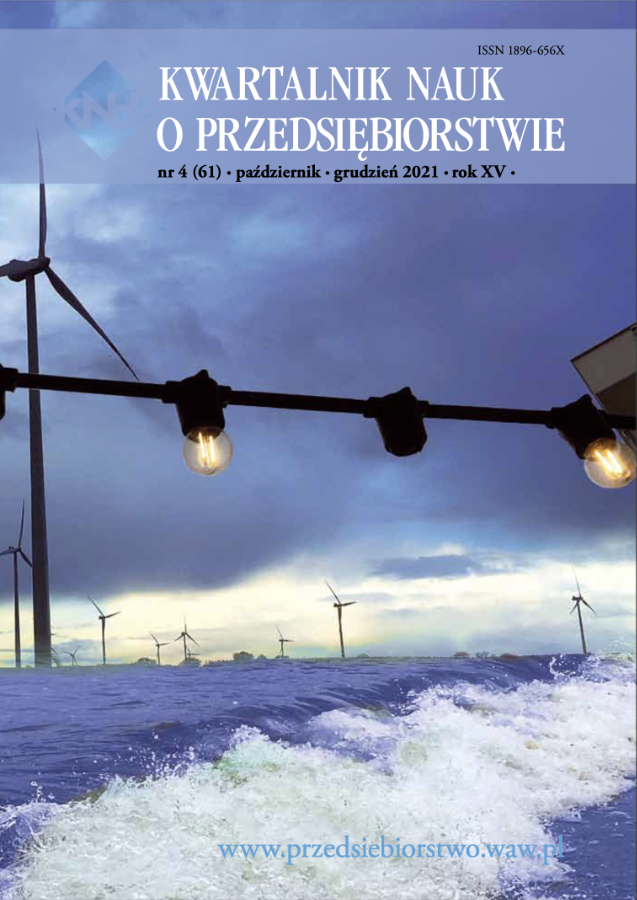Impact of business environment institutions on initiating and performing business activities
Main Article Content
Abstract
The creation of adequate conditions for business activities by business environment institutions may contribute to the overall economic development by attracting new investments and expanding the existing ones. The main aim of this research was to identify the potential changes in time concerning the importance of business environment institutions and their impact on initiating and operating economic activities, and to establish whether these changes were statistically significant. The research indicates that both the representatives of various business environment institutions and the entrepreneurs found that the measures implemented by institutions during the time of this research became more significant in comparison to the period of 10 and more years before. In addition, the impact of the measures implemented by all the institutions enumerated in the questionnaire was statistically different between the two periods under investigation.
Downloads
Article Details
The author of the article declares that the submitted article does not infringe the copyrights of third parties. The author agrees to subject the article to the review procedure and to make editorial changes. The author transfers, free of charge, to SGH Publishing House the author's economic rights to the work in the fields of exploitation listed in the Article 50 of the Act of 4 February 1994 on Copyright and Related Rights – provided that the work has been accepted for publication and published.
SGH Publishing House holds economic copyrights to all content of the journal. Placing the text of the article in a repository, on the author's home page or on any other page is allowed as long as it does not involve obtaining economic benefits, and the text will be provided with source information (including the title, year, number and internet address of the journal).
References
2. Alvarez C., Urbano D., Coduras A., Ruiz-Navarro J. (2011), Environmental conditions and entrepreneurial activity: a regional comparison in Spain, “Journal of Small Business and Enterprise Development”, Vol. 18(1), pp. 120-140.
3. Baumol W. J., Strom R. J. (2007), Entrepreneurship and economic growth, “Strategic Entrepreneurship Journal”, Vol. 1(3-4), pp. 233-237.
4. Boettke P.J., Coyne C.J. (2009), Context matters: institutions and entrepreneurship, “Foundations and Trends Entrepreneurship”, Vol. 5 (3), pp. 135-209.
5. Braunerhjelm P., Acs Z.J., Audretsch D.B., Carlsson B. (2010), The missing link: knowledge diffusion and entrepreneurship in endogenous growth, “Small Business Economics”, Vol. 34, No. 2, pp. 105-125.
6. Davidson N., Mariev O. (2019), Factors Determining Enterprise Location Choice in Russia. In Proceedings of the 11th Economics & Finance Conference, International Institute of Social and Economic Sciences.
7. Duran Peralta J. (2019), Regional development and entrepreneurship: evidence for Colombia, “El trimestre economico”, Vol. 86, n. 342, pp. 467-490.
8. Escandon D., Urbano D., Hurtado-Ayala A. (2019), Exploring the Relationship between Formal and Informal Institutions, Social Capital and Entrepreneurial Activity in Developing and Developed Countries, ”Sustainability”, Vol. 11, pp. 1-20.
9. Fuentelsaz, L, González C., Maícas J.P., Montero J. (2015), How different formal institutions affect opportunity and necessity entrepreneurship, BRQ Business Research Quarterly, Vol. 18(4), pp. 246-258.
10. Godlewska M. (2019), Do interactions between formal and informal institutions matter for productive entrepreneurship? “Ekonomia i Prawo”, Vol. 18(1), p. 17-28.
11. Godlewska-Majkowska K. (2018), Investment Attractiveness of Polish Municipalities in Relation to Local Entrepreneurship, “Olsztyn Economic Journal”, Vol. 13(2), pp. 105-122.
12. Griffin R.W. (2015), Fundamentals of management, 8th ed., Cengage Learning: Boston, USA.
13. Knowles S., Weatherson C. (2006), ”Informal Institutions and Cross-Country Income Differences”, CREDIT Research Paper, University of Nottingham, No 06/06.
14. Kola M., Kujawka M., Kuzel M. (2005), Badanie uwarunkowań i skutków bezpośrednich inwestycji zagranicznych w województwie kujawsko-pomorskim, in: Bezpośrednie inwestycje zagraniczne w województwie kujawsko-pomorskim (stan, znaczenie dla gospodarki województwa, stymulanty i destymulanty napływu), (ed) Karaszewski W., Wydawnictwo UMK w Toruniu, Wydział Nauk Ekonomicznych i Zarządzania, Toruń, Poland, pp. 33-45.
15. Lisowska R. (2016), The Potential of Business Environment Institutions and the Support for the Development of Small and Medium-sized Enterprises, “Entrepreneurial Business and Economics Review”, Vol. 4(3), pp. 85-101.
16. Lizińska W., Marks-Bielska, R. Serocka I. (2014), Operations performed by business environment institutions in the process of foreign investment acquisition: a case study of investor service centres, “Equilibrium, Quarterly Journal of Economics and Economic Policy”, Vol. 9, Issue 4, pp. 65-78.
17. Marks-Bielska R. (2014), Factors Affecting Farmland Management in Poland in 1992-2012 in the Institutional Context (No. 35), Jelgava: Latvia University of Agriculture. International Scientific Conference Proceedings, 24-25 April 2014, pp. 189-198.
18. Paz R., Cabrer-Borrás B. (2019), Entrepreneurial capital and productive efficiency: the case of the Spanish regions, “Technological and Economic Development of Economy”, Vol. 25(6), pp. 1-17, 1363-1379.
19. Sobel R. (2008), Testing Baumol: Institutional quality and the productivity of entrepreneurship, “Journal of Business Venturing”, Vol. 23, pp. 641-655. doi:10.1016/j.jbusvent.2008.01.004
20. Urbano D., Alvarez C. (2014), Institutional dimensions and entrepreneurial activity: an international study, “ Small Business Economics”, 2014, Vol. 42(4), pp. 703-716.
21. Wennekers S., Thurik,R. (1999), Linking entrepreneurship and economic growth, “Small Business Economics”, Vol. 13(1), pp. 27-56.
22. Wierzbicka W. (2013), Quality of location in regions and economic efficiency of private companies in Poland, “Olsztyn Economic Journal”, 2013, Vol. 8, pp. 121-134.

